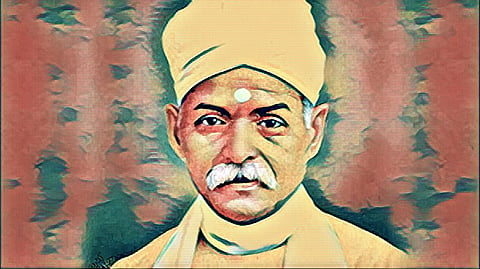The Consequences of Ignoring Pandit Madan Mohan Malaviya’s Warning: A Preface
“You are the mother of four children. Think of The Leader newspaper as your fifth child. Now, this child has been struck by disease. Shouldn’t this child be saved at any cost?”
That was Pandit Madan Mohan Malaviya, “the foremost among all Bhikshus in India” standing before his wife, Smt Kundan Devi with the proverbial begging bowl in his hand. Indeed, she was the first person he would beg for help in order to somehow save his paper, The Leader, which eventually became one of the most influential dailies in the country. Smt Kundan Devi was every bit his ideal wife and companion. Without thinking twice, Smt Kundan Devi sold all her jewelry and put a princely sum of ₹3,500 in the hands of Madan Mohan Malaviya. Her voice was choked when she said, “Was it even necessary to utter all those words for such a small matter?” The Leader was saved.
A lesser-known contribution of Pandit Madan Mohan Malaviya is the pioneering and all-encompassing role he played in Indian journalism. He edited the Hindustan newspaper from 1887-89, published from Pratapgarh and was briefly the editor of The Indian Opinion. In 1909, he simultaneously founded the Hindi weekly, Abhyudaya from Prayag and the selfsame Leader. About three decades later, he founded Sanatana Dharma exclusively dedicated to issues concerning Hinduism. It quickly attained fame as the best in class of such publications. When Hindustan Times, Indian People, and Hindustan Review papers were hurtling towards extinction in the 1920s, he stepped in and turned them around almost singlehandedly.
Pandit Madan Mohan Malaviya was also the first ever editor and publisher to pay honorariums to external columnists: a princely sum of ₹ 1.25 per column. He regarded this as a mark of respect that men of letters were owed. The fact that a simple thought like this hadn’t even occurred to his predecessors is a good reflection of the climate of that era. Madan Mohan Malaviya was also the first editor to invite traditional Pandits, full-time scholars, and eminent public personalities to write for dailies and other periodicals, and turned them into nearly full-time columnists. Prominent names include Motilal Nehru, Gandhi, Pandit Mahavir Prasad Dwivedi, and Hazari Prasad Dwivedi, who was greatly influenced by Pandit Malaviya.
Like his awe-inspiring body of work in other spheres of our national life, Pandit Malaviya’s foray in journalism was underscored by five non-negotiable principles:
- Devotion to the Motherland
- Reawakening and dissemination of Dharma
- Devotion to truth
- Cultural rejuvenation
- Unswerving commitment to traditional and timeless values
His extraordinary speech on September 26 1922 in Lahore reveals not only his vision of journalism but the appalling extent of the subsequent downfall of the profession:
This is my prayer to those who run newspapers: let no article that arouses base thoughts in the minds of the public be published in your papers. Let no exaggeration creep in your publications. Let everything that is published have the foundation of truth. Let everything that is published have the fundamental aim of fostering and strengthening the unity and integrity of this country.
This was among the other noble values that informed, shaped, and directed our freedom struggle. I’m still unable to fathom the meaning of “independence” when I recall the fact that India’s first Prime Minister, Jawaharlal Nehru, gave vast expanses of prime land in Delhi to newspapermen at paltry prices. This Prime Ministerial bribe was a direct and perverse blow to everything that Pandit Malaviya stood for. It was also the foundational brick that built the swanky villa which was later inhabited by the likes of Barkha Dutt, Vir Sanghvi and other newstraders whose sordid record of political pimping needs no repetition here.
The prescience of Mahamana Madan Mohan Malaviya’s fivefold guideline can be gauged in its violation by the media of “independent” India. As a back-of-the-envelope experiment, tick each of the aforementioned five items and see for yourself the consequences of their violation. In summary, this is how they have played out in the lived experience of national life: in the garb of freedom of expression, what we have lost are the non-negotiable values of something as basic as the unity, integrity and sovereignty of India. Forget the actual content. Even in terms of sheer volume, the corpus of content that openly militates against the unity and integrity of India, abuses our judiciary and law enforcement machinery, and glorifies terrorists and breaking India forces in the name of human rights is truly staggering.
The foregoing account of Pandit Madan Mohan Malaviya’s extraordinary contributions to journalism is a mere glimpse of just one tiny pearl in the ocean of his lifelong Tapas which took various outward expressions of national and civilisational service. It is also a preface of sorts to what he chose as the true calling of his life: founding the Banaras Hindu University (BHU). Two years after the BHU was established, Pandit Madan Mohan Malaviya made an impassioned speech at Delhi in his capacity as the President of the Indian National Congress. Here is an excerpt:
Standing in this ancient capital of India, both of Hindu and Muhammadan period – it fills me…with inexpressible sorrow and shame to think that we the descendants of Hindus who ruled for four thousand years in this extensive Empire…should have so far fallen from our ancient state that we should have to argue our capacity for even a limited measure of autonomy and self-rule. [Emphasis added]
Twenty-eight years later when he noticed which way the national and social winds were blowing, Pandit Madan Mohan Malaviya would build on this speech. It would be his farewell message cum warning to Hindus and the Sanatana society. To be continued
The Dharma Dispatch is now available on Telegram! For original and insightful narratives on Indian Culture and History, subscribe to us on Telegram.


